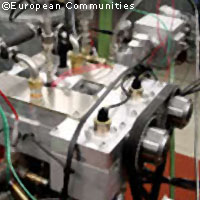EU research brings efficient hydrogen engines a step closer
European researchers working with partners from the US have developed a new type of hydrogen technology that will lead to new more efficient hydrogen-fed engines for clean cars. The EU-funded Hydrogen Internal Combustion Engine (HyICE) project tested ways to build hydrogen-fuelled engines that are as efficient as current diesel engines, without the same pollution, and with as little as possible trade-off in terms of engine size and power. The researchers hope these hydrogen-fed engines will offer clear advantages over current generation engines and be able to compete with other propulsion systems to offer the same kind of performance and cost drivers expect. In taking the internal combustion engine as their starting point, the members of the three-year project led by the inventor of the automobile, BMW, focused on developing new components such as injectors and an ignition system, as well as the preparation of computational fluid dynamics (CFD) tools to optimise the process of mixture formation and combustion. 'The combustion engine is one of the most highly developed industrial products. Over one hundred years have been invested in its development. It demonstrates high performance levels and variability with low costs and easy maintenance on a daily basis' said Raymond Freymann, Head of BMW Group Research and Technology. 'With the use of hydrogen, it is already providing a well-developed technical solution for sustainable mobility. We are convinced that even in the future individual mobility using the hydrogen combustion engine will remain an attractive method of transportation' added Prof Freymann. The final result is an environmentally-friendly engine with a distinct performance of 100 kW per litre cubic capacity (displacement), bringing the possibility of hydrogen-only cars a step closer. Only the infrastructure for hydrogen is missing but Daniel Kammerer, Head of Alternative Drive Trains, Technical Communications for BMW, believes that this will simply be a question of time. 'We believe this is the first step in a whole chain of events we hope will lead to environmentally friendly sustainable mobility. Now that the technology exists all that is needed is the infrastructure to provide hydrogen to consumers,' he told CORDIS News. Furthermore European hydrogen experts have shared their findings on a regular basis with researchers from the US Department of Energy laboratories and universities in the US. 'The HyICE project clearly demonstrates the contribution EU research can make to reduce our dependence on fossil fuels. This is an example of successful EU investment in pre-competitive research, with a potential impact reaching way beyond Europe's borders,' said European Science and Research Commissioner Janez Potocnik. 'The results achieved with this hydrogen combustion engine should encourage industry to develop this form of mobility further. By developing such technology, we can preserve our environment and at the same time keep Europe at the forefront of global competition,' he added. The project was one of the first EU Integrated Projects to be completed in the area of sustainable surface transport.
Countries
Austria, Germany, Spain, France



